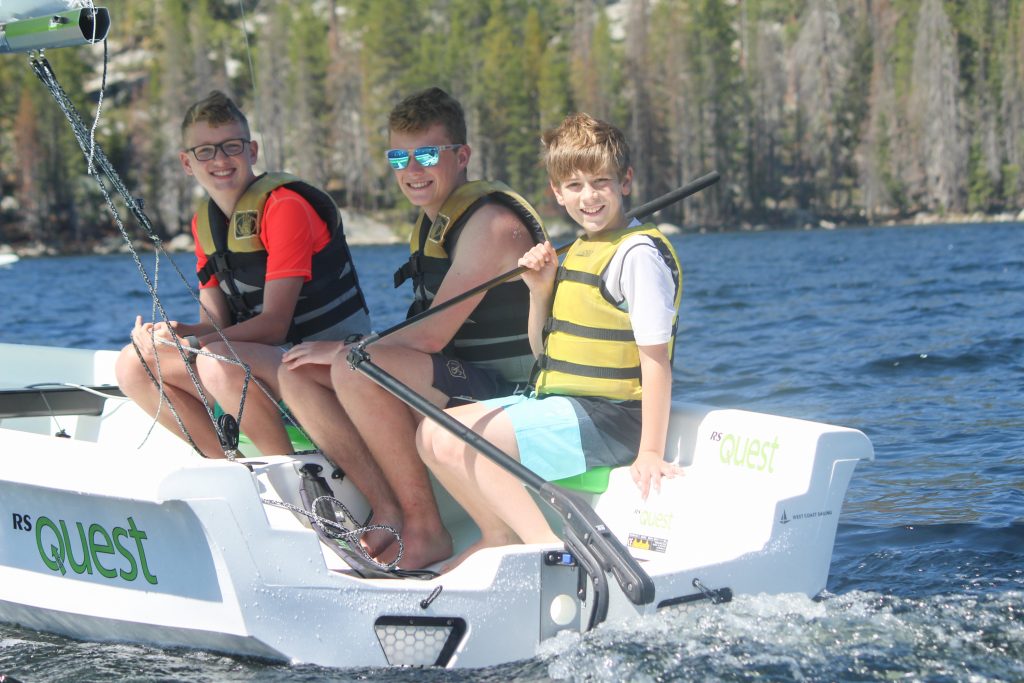What to Say to a Nervous Camper
This post and video is for those of you who have decided that your child is going to camp, and especially for those of you who had a previously excited camper who is now having last-minute camp anxiety.
Positive, Encouraging Messages for a Nervous Camper
Here are some positive messages you can give prior to dropping your camper at the bus or at camp. Pick and choose, and of course use your own words, but acknowledge your child’s feelings and empathize with them while holding firm in your confidence in their ability to succeed and your belief that camp will be good for them.
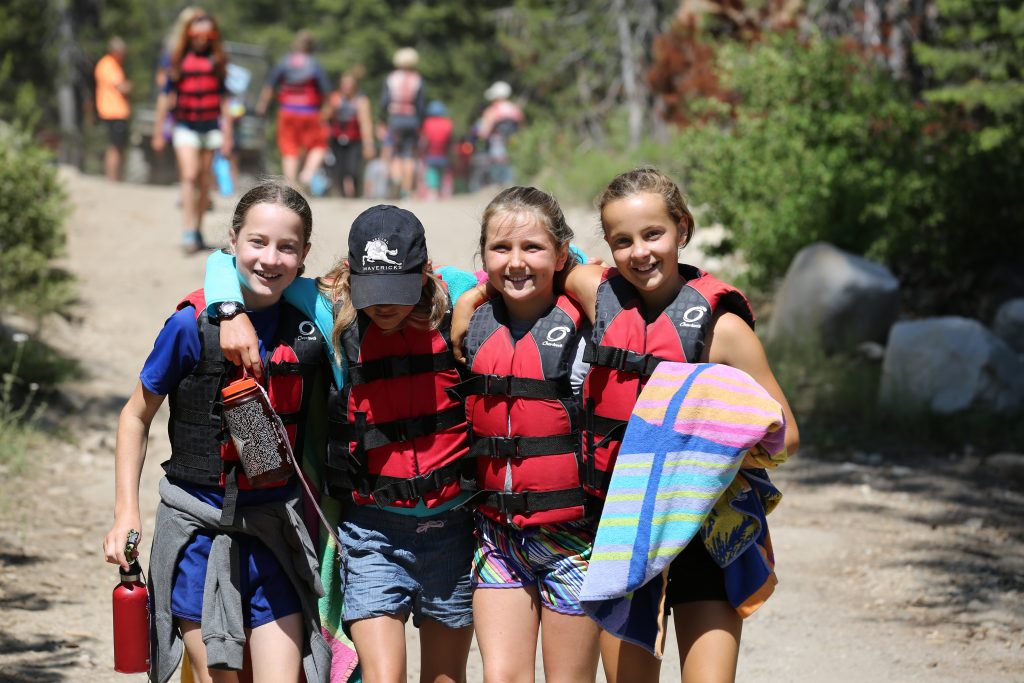
One thing I’ve learned after close to three decades at camp is that the same kids who are anxious and hesitant about going to camp when they’re nine or ten will still be anxious when they’re 13. And they may not be interested in going away to college when they’re 18, either. As a parent, you need to decide how to approach your child’s separation anxiety, as well as your own. You can avoid it and not send them to camp and hope that they develop independence in other ways, which is definitely possible. Or, you can bite the bullet, give them positive and encouraging messages, and send them off to camp with a smile, knowing that it may be hard for them, but they will grow from the experience.
Words to say
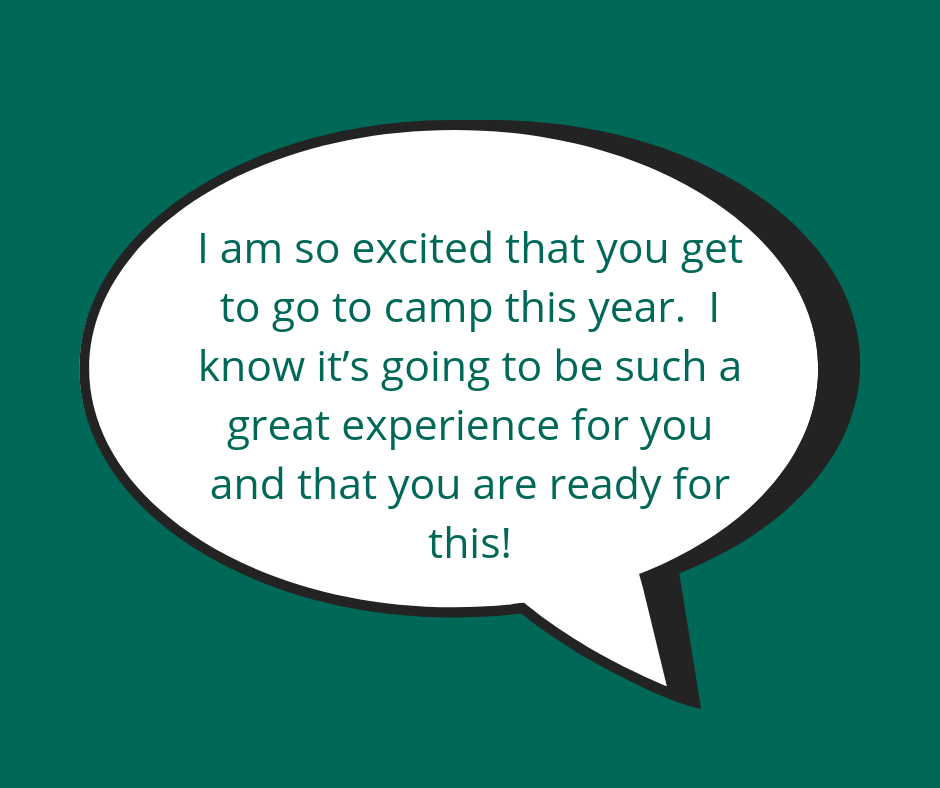
“It may seem like a long way off, but in a few years, you’ll be ready for college. I want you to feel confident in your ability to live away from me, so that you can choose any school you like, even if it’s far away from home. Think of camp like your practice time for when you’re older and ready to move away for school or a job. You’ll get better at being independent by starting now, when you’re young, with short spurts of time away. Some kids aren’t doing well when they start college because they don’t have any experience being away from home. I want you to feel great when you go to college, because you’ll know that you’ve already been successful with short camp stays.”
“You may feel homesick, and that’s okay. A lot of kids feel that way. That just means that you love us and you love home. I feel homesick when I’m on trips, too. Missing home is part of life. But I know you can still have fun at camp, even if you feel sad sometimes.”
“There are adults at camp (counselors, directors) who are there to take care of you and help you with anything you need. They can help with things you normally come to me about. Let them know if you are feeling sad, and they can help you. They have lots of experience working with kids who are away from home for the first time.”
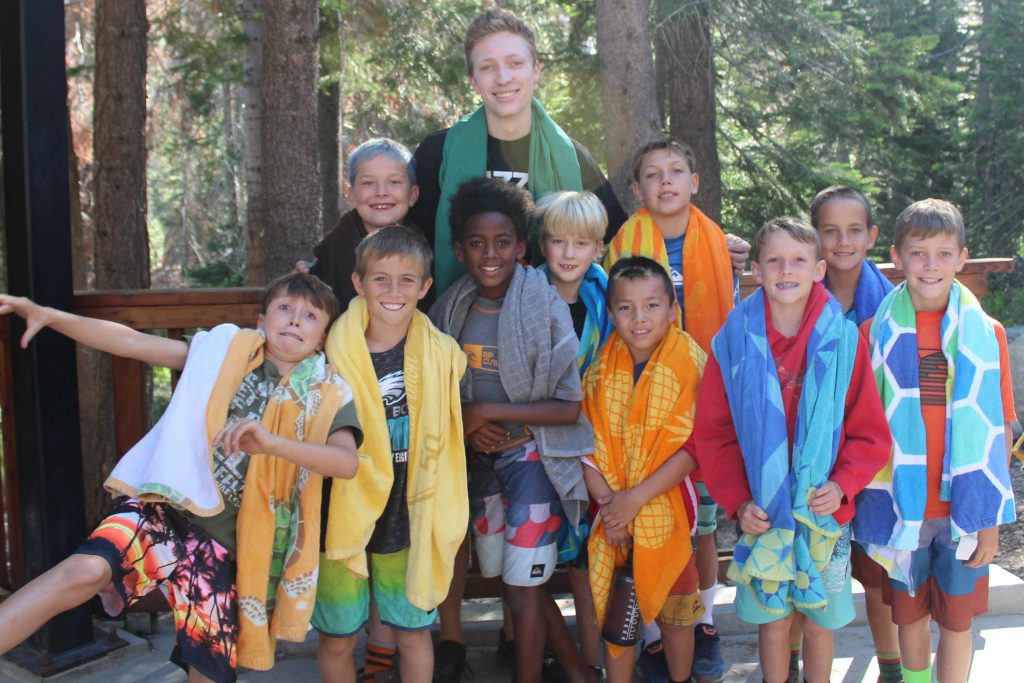
“Many good things in life aren’t easy at first. Learning a new sport or trying something new is really hard. Sometimes you have to get out of your comfort zone to discover something you really love. If you never go through anything hard, you’re going to miss out on some great experiences. The first few days of camp may be hard, and that’s okay. I know you’ll work through it and figure out what makes you feel better. I have confidence in you, and I am so proud of you for going to camp and trying this new adventure!”
“Every day comes with its good and bad parts. When you’re at camp, I want you to write me letters and tell me all of the stuff that you’re doing and feeling. If you feel homesick at rest time, tell me about it, and also tell me what you did to help yourself. Did you talk to your counselor? Keep yourself busy playing cards with friends? Write me a letter? I also want you to share good stuff. Did you get your favorite food for lunch? Try rock climbing? Get up on a knee board? I want to hear both the good and bad things about camp in your letters.”
“I am so excited that you get to go to camp this year. I know it’s going to be such a great experience for you and that you are ready for this.”
“Even if you’re a little homesick for the whole time you’re at camp, you’re going to feel so much better about the experience if you stick it out and make the best of it. Most kids feel better after a few days of getting settled in and adjusted, and I know you’ll feel great once you let yourself relax and just start enjoying all the fun things at camp. I’m not going to pick you up early, no matter what, because I know you will feel really proud of yourself for making it through camp, even if you have some hard days.”
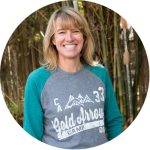
Audrey “Sunshine” Monke has been the owner of Gold Arrow Camp since 1989. She is author of the 2019 parenting book, Happy Campers: 9 Summer Camp Secrets for Raising Kids Who Become Thriving Adults. “Sunshine” has been writing and podcasting about summer camp, well-being, social skills, and parenting at Sunshine Parenting since 2012.
More Resources
10 Messages for a Homesick Camper
When Your Camper Doesn’t Want to go Back to Camp
How to Prepare for Overnight Summer Camp (Video or Podcast)
Choose Kindness
We cannot tell the precise moment when a friendship is formed. As in filling a vessel drop by drop, there is at last a drop which makes it run over; so in a series of kindnesses there is at last one which makes the heart run over.
Dr. Samuel Johnson (1709-1784)
Summer, 2022 Theme: Choose Kindness
We selected Choose Kindness as our 2022 Summer Theme because growing our campers’ “kindness muscles” aligns with our mission of equipping campers to thrive despite life’s challenges. Focusing on kindness also helps us meet our goals of building our campers’ friendship skills (Make Friends) and growing their positive character traits (Grow). Learn more about our vision, mission, and goals on our Why GAC? page.
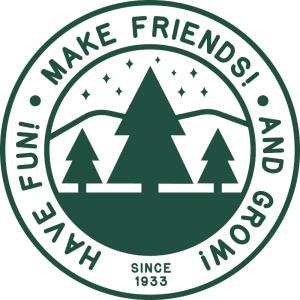 Our kids are growing up in a challenging and divisive time. They are, unfortunately, witnessing a lot of disrespectful and mean behavior. In my book, I wrote about the importance of modeling and growing the trait of kindness in our kids. Here’s an excerpt from the kindness chapter:
Our kids are growing up in a challenging and divisive time. They are, unfortunately, witnessing a lot of disrespectful and mean behavior. In my book, I wrote about the importance of modeling and growing the trait of kindness in our kids. Here’s an excerpt from the kindness chapter:
The example and messages kids get from the media (and their school hallways) often do not promote kindness. Many kids learn that the quickest route to popularity is putting others down or leaving other kids out. In the perceived zero-sum social worlds of middle and high school, one person being put down means you get on a higher rung of the social ladder. Social media posts, political discourse, and cultural norms often promote name-calling and being mean, gossiping, and telling jokes at the expense of others. That’s what our kids are seeing and hearing every day, and that’s also why many kids start to consider it cool to perpetrate mean behaviors. It’s no wonder that while adults are sending hateful messages through tweets, our kids are practicing a similar level of meanness on their own media. Why are adults so shocked to hear about horrendous stories of cyber and in-person bullying when we as adults are modeling that very same behavior? But there is hope for our world, because kids intuitively understand the benefits of kindness and can be taught to be kinder when we take the time to model, talk about, and practice kindness with them.
Camp Secret #8: Make it Cool to Be Kind (Happy Campers: 9 Summer Camp Secrets for Raising Kids Who Become Thriving Adults)
This summer at GAC, we’re putting the spotlight on what it looks and feels like to choose kindness in our interactions with and response to others.
We’ll be growing our campers’ kindness muscles by:
- Talking about and practicing kindness habits like building each other up with positive words (WOWs!) and doing random “GACs of Kindness.”
- Practicing conflict resolution skills and learning how to respond (not react) with kindness and clear boundaries when others upset us with their behaviors or words.
- Focusing on how being kind helps us make friends and form friendships that are stronger and longer lasting.
- Doing projects and activities that involve giving to others.
- Reflecting on how it makes us feel to choose kindness and practice being kind to others. (Spoiler alert: We feel happier when we’re being kind!)
From the moment campers arrive, counselors will be modeling for and encouraging them to incorporate kindness into their daily words, actions, and routines. “GACs of Kindness” will be recognized and praised by counselors, announced at our daily Morning Assemblies, posted on our WOW board, and talked about throughout the session.
Helping others makes people happy. It feels good to share, to give, and to be kind to others. Sometimes in secret, and sometimes in front of others, we’ll be doing kind things for our fellow campers, counselors, support staff, and those outside our camp community this summer.
One of the great things about Gold Arrow Camp is that so many people feel happy when they’re here. We’re committed to equipping our campers with habits and skills that they can practice long after their session at camp.
This summer, we’re focusing on how – regardless of our circumstances and others’ behavior – we can always choose kindness.
Kindness Links/Resources
2022 Gold Arrow Camp Kindness Calendars
2022 Kindness Calendars
Check out GAC’s Kindness Calendars for the 2022 year! Click on each month for a printable version or click here to print all 12 months!
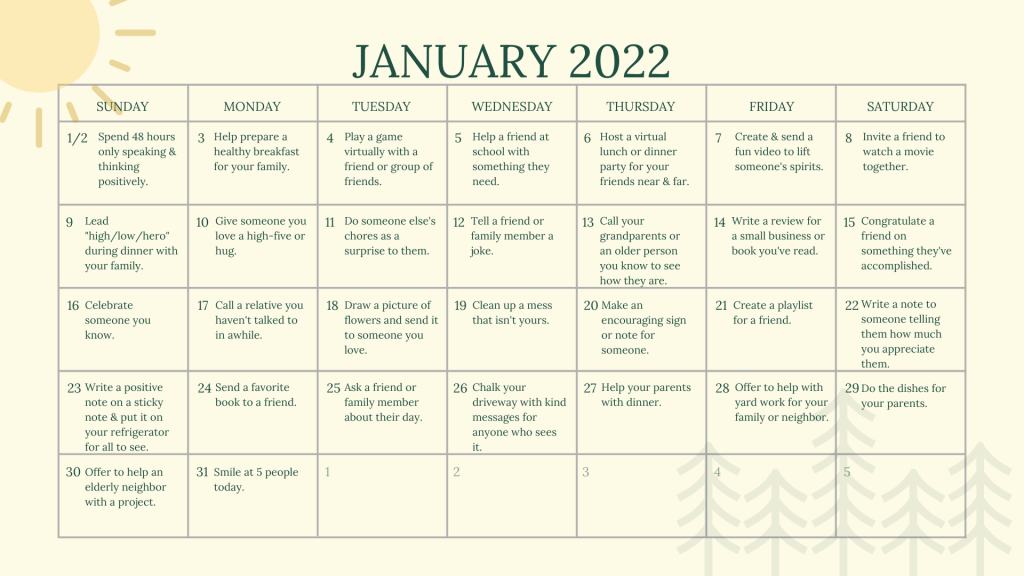
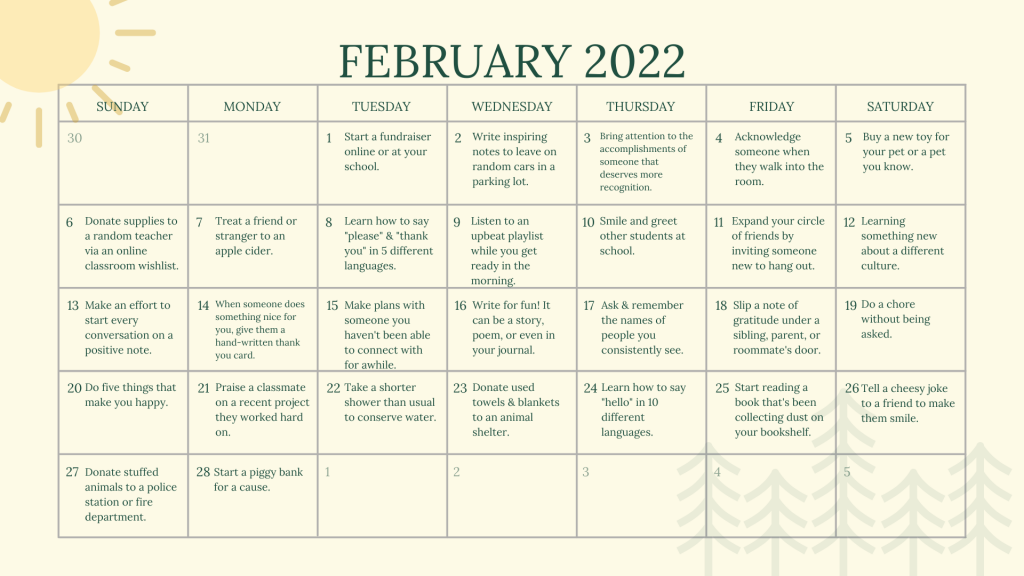
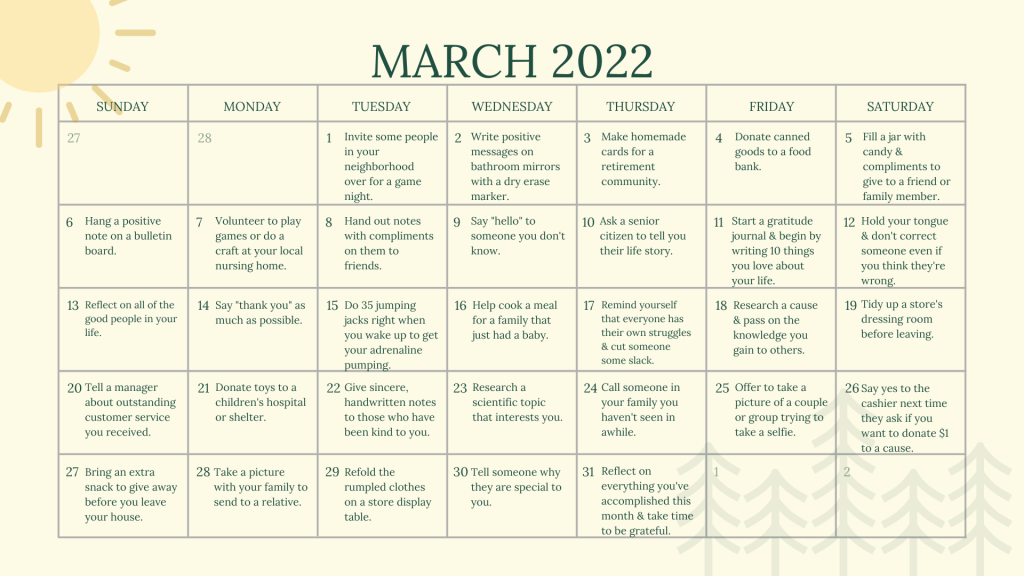
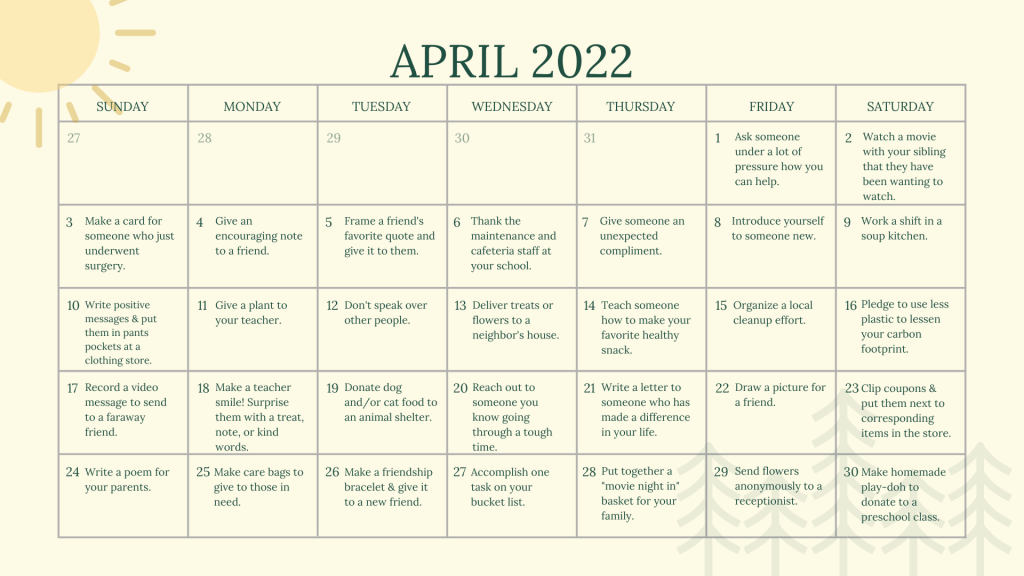
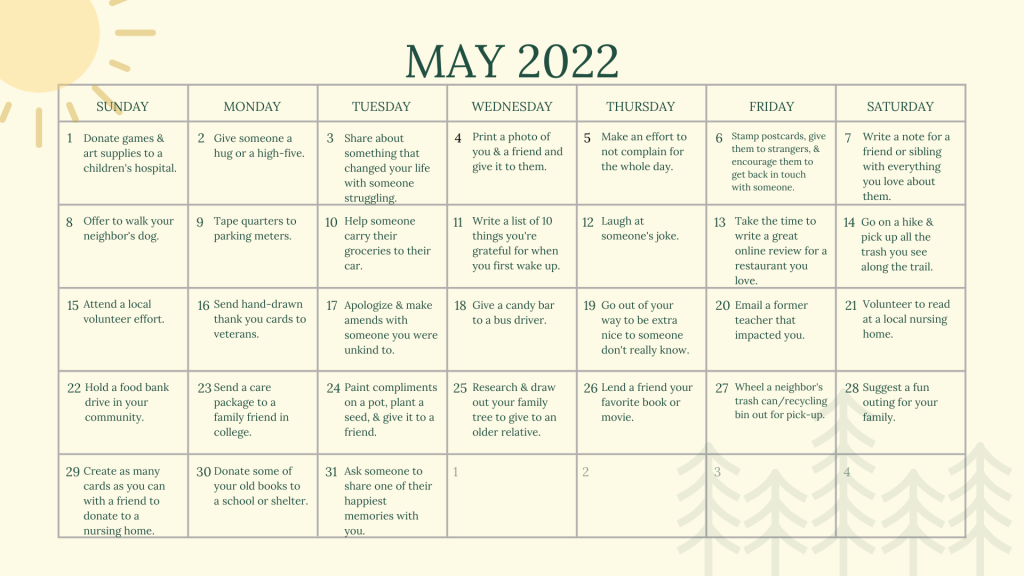
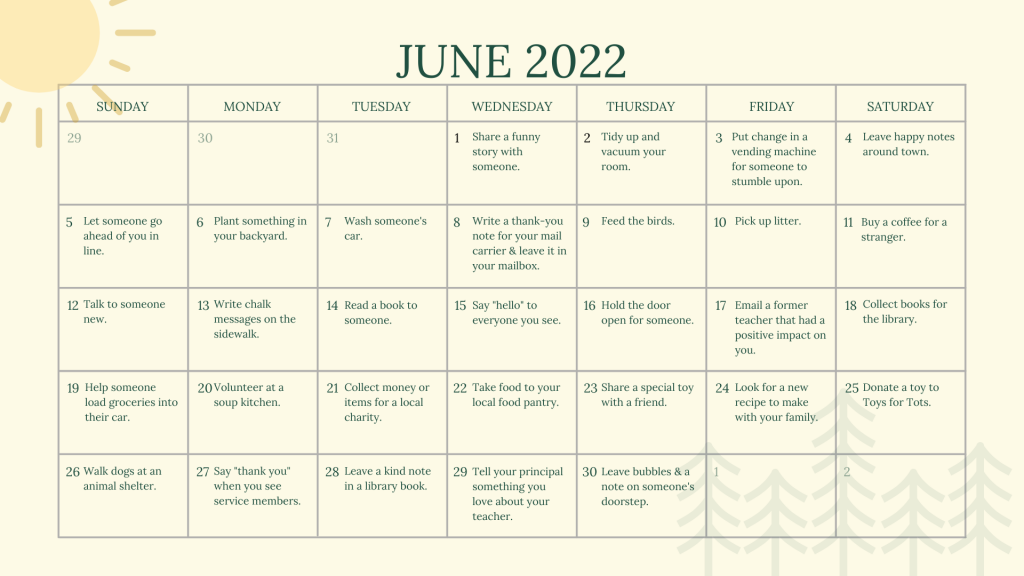
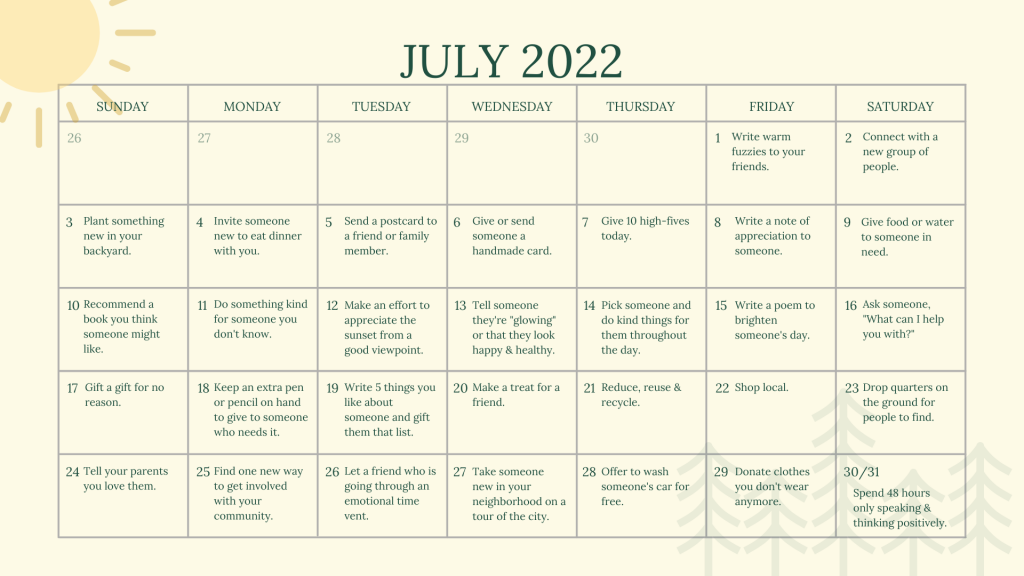
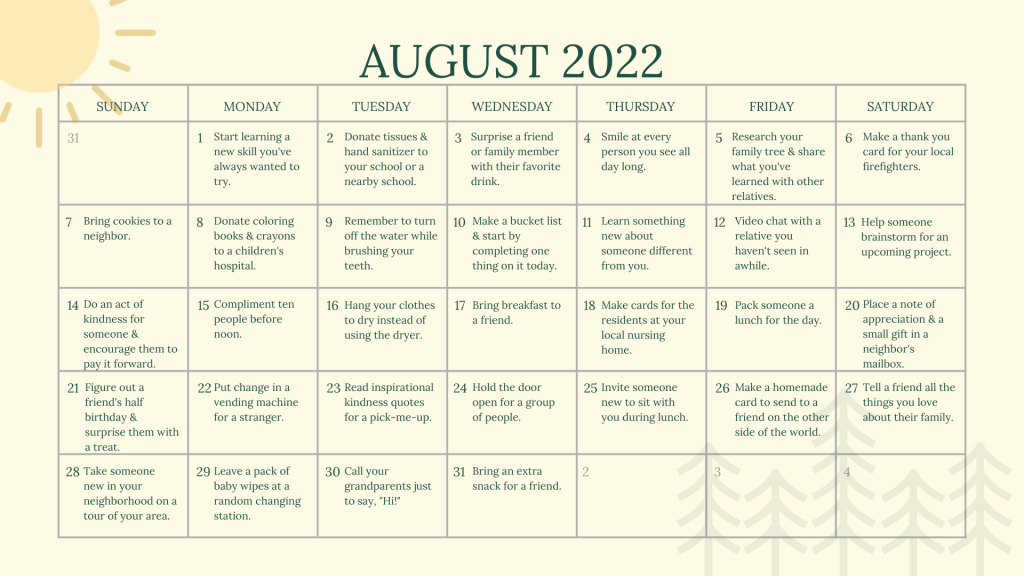
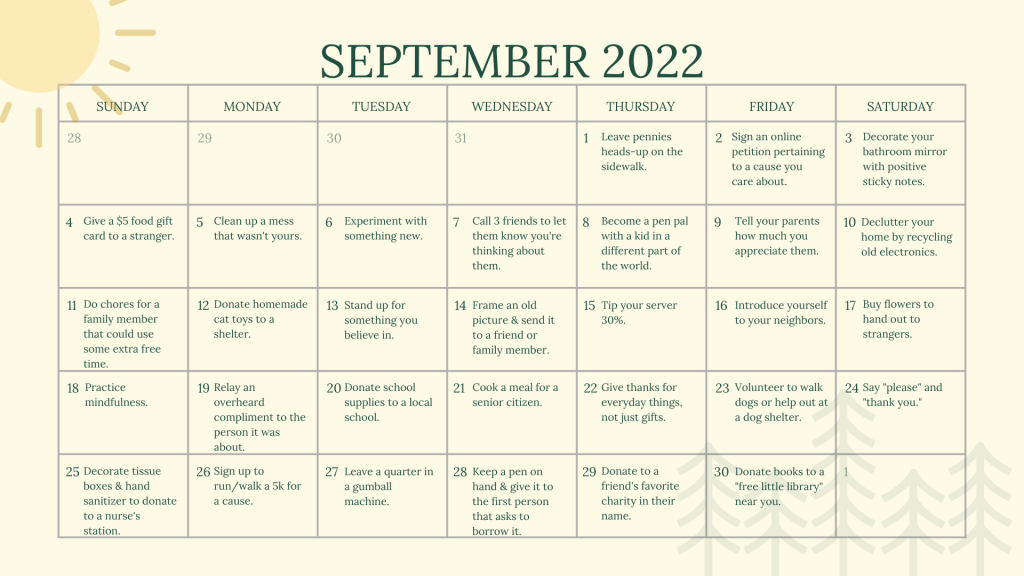
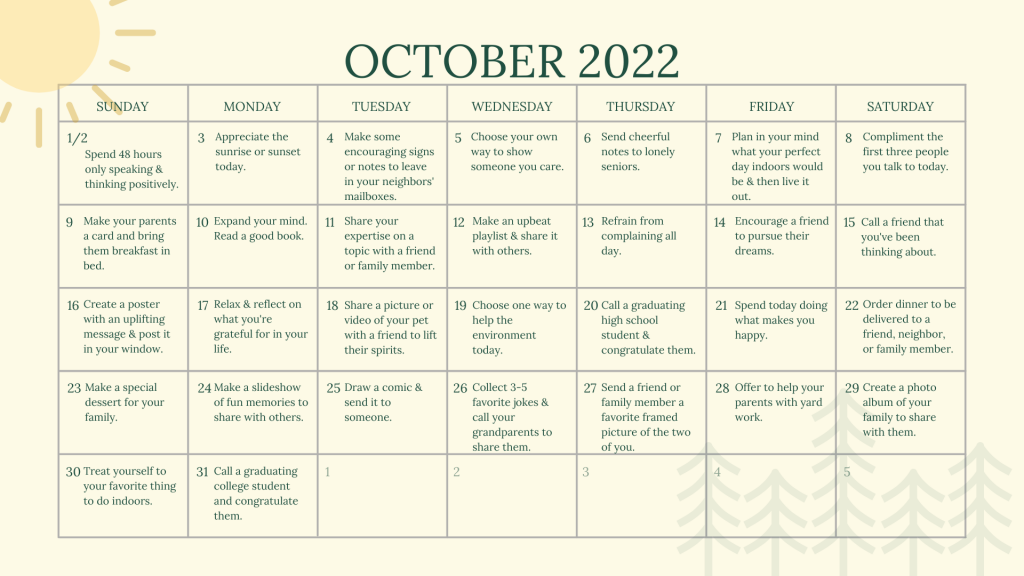
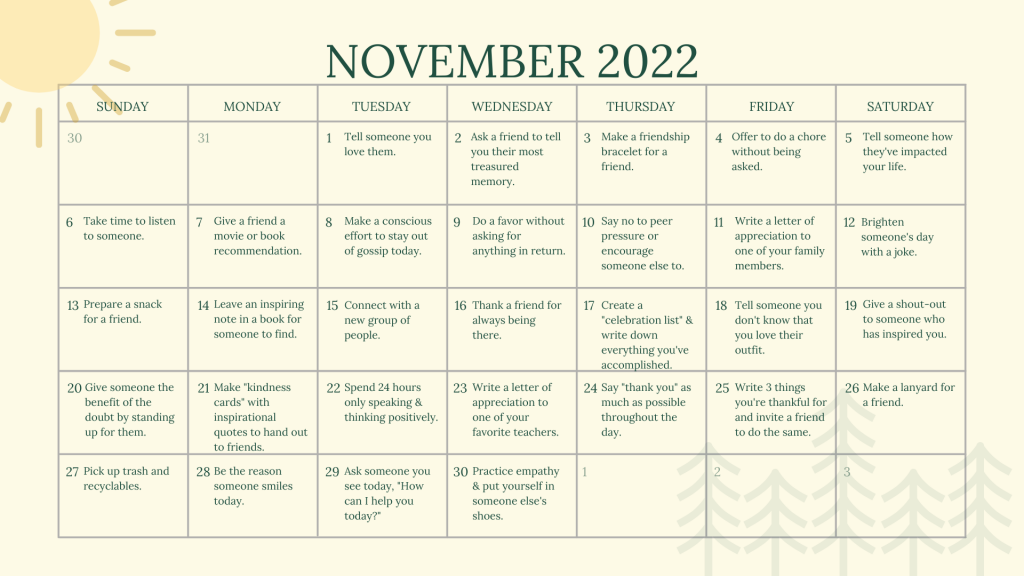
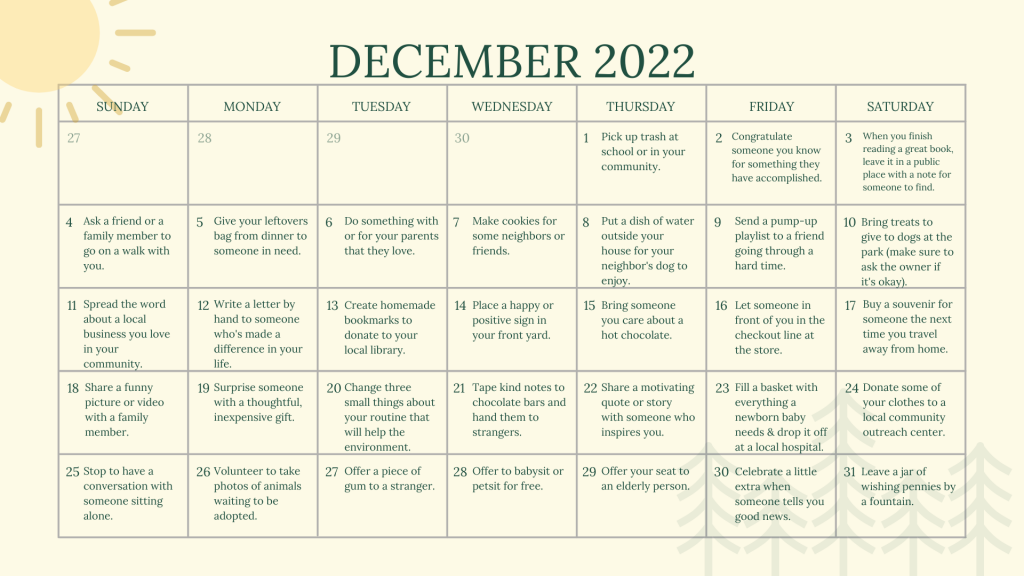
Why Kids Flourish at Camp
Traditionally, psychologists have focused on studying psychological diseases – depression, anxiety, eating disorders, etc. – and their cures. But led by Martin Seligman (University of Pennsylvania), a new breed of psychologists called Positive Psychologists have, for the past decade, been studying the positive side of people. They ask not what is wrong with people, but what is right. Originally, Seligman had a theory of “happiness” outlined in his book Authentic Happiness, but he moved away from only using the word “happiness” to a new theory that focuses instead on well-being or “flourishing.”
Seligman uses the acronym PERMA to define his theory and the five measurable elements he has determined lead to well-being. As I read about each pillar of PERMA in Seligman’s book, Flourish: A Visionary New Understanding of Happiness and Well-being, I kept having “ah-ha” moments. “This happens at camp!” I would think. “And this, too!” In fact, as I read, I determined that ALL of the elements of flourishing that Seligman describes happen at camp. According to Seligman, “No one element defines well-being, but each contributes to it.”
PERMA at Camp
P: Positive Emotion
E: Engagement
R: Relationships
M: Meaning
A: Achievement
P: Positive Emotion
Positive emotion is exactly what it sounds like: feeling happy and having positive thoughts about yourself, the people around you, or your surroundings. At camp, positive emotions are the norm, not the exception. We’re singing; we’re dancing; we’re doing skits that don’t make sense but that cause us to laugh so hard our stomachs hurt. You can almost see a haze of happiness and fun surrounding everyone at camp.
E: Engagement
Seligman’s next element, engagement, describes when one is interested in and connected to what they are doing. At camp, kids are constantly exposed to new experiences and challenges – both recreational and social – that get them interested and excited to learn. They’re pushed to get outside their comfort zone and really engage.
R: Relationships
We all know that positive relationships are one of the main contributors to our happiness in life, so it’s no surprise that relationships are an important pillar of Seligman’s theory. Everyone comes to camp to see their old friends, make new friends, and just spend quality time connecting with others and building positive relationships. And camp is like no other place for that.
M: Meaning
According to Seligman, meaning comes from “belonging to and serving something you believe is bigger than the self.” Being a member of a cabin group at camp helps kids gain an understanding of how they are valued by others. For some kids, camp is the first place where they understand what it means to be a valued and accepted member of a community. Kids learn that they are important and valued members of their cabin group, and they discover their character strengths through recognition from peers and counselors.
A: Achievement
People flourish when pursuing goals or the mastery of a skill. Every day at camp, kids have the opportunity to try new things and master new skills. Some kids arrive at camp with a specific goal: a bull’s eye at archery or getting up on a slalom water ski. But others simply practice and work towards improving or challenge themselves to try something that frightens them – like completing the ropes course. And all of their progress and little achievements add to kids’ flourishing at camp.

Audrey “Sunshine” Monke has been the owner of Gold Arrow Camp since 1989. She is the author of the 2019 parenting book, Happy Campers: 9 Summer Camp Secrets for Raising Kids Who Become Thriving Adults. “Sunshine” has been writing and podcasting about summer camp, well-being, social skills, and parenting at Sunshine Parenting since 2012.
More Resources
Five Reasons Every Teen Should Go To Summer Camp
By Audrey “Sunshine” Monke. Originally published at Sunshine Parenting
#1 Improve Interpersonal Skills & Form Close Friendships
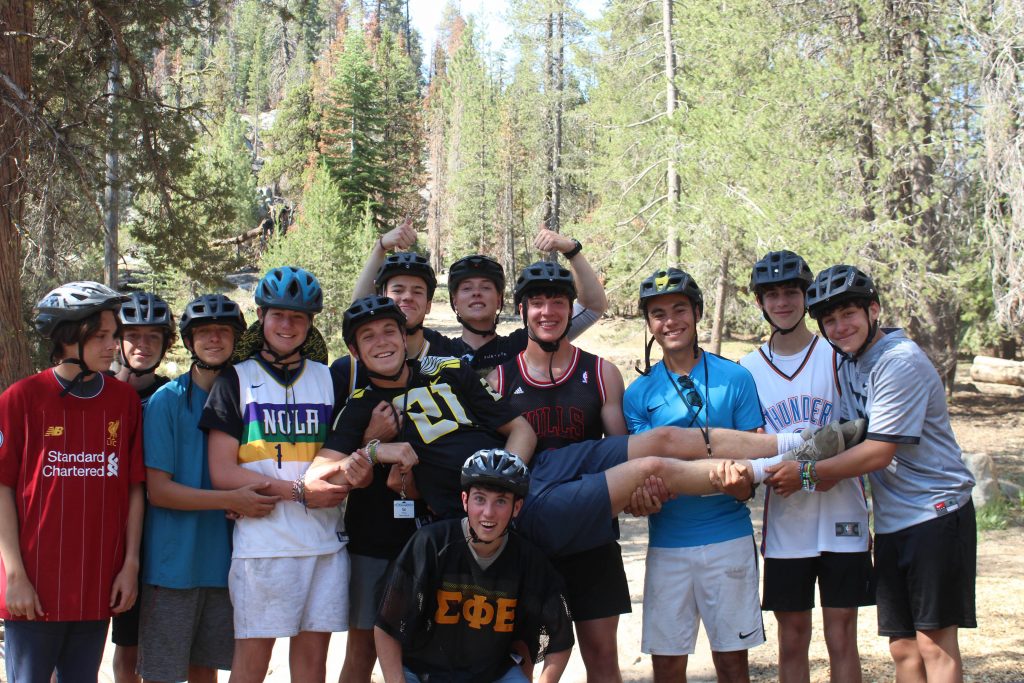
“In a … study of 515 senior executives, emotional intelligence was a better predictor of success than either relevant previous experience or high IQ.” -Forbes, “Look for Employees with High EQ over IQ”
In a world where anyone can look up a fact or equation and where machines are replacing even complex workplace tasks, employers need employees who can interact effectively with other people. This is one of the most important skills teens learn at camp. In the unplugged, non-competitive camp culture, teens build up their “emotional intelligence” (EQ), their face-to-face communication and relationship skills. 21st-century employers need people who can communicate, collaborate, and cooperate with others, and teens who come to camp get to practice those skills every day.
If you are debating whether your teen can miss a few weeks of SAT prep or a summer academic program, know that the 1600 SAT score will never outweigh the important communication and relationship skills he or she will develop at camp. Whether on a backpacking trip, cheering each other through a ropes course, or chatting around the campfire, the interpersonal skills teens build are the same ones they’ll need to be successful adults in families, communities, and companies.
#2 Take Safe Risks and Challenges
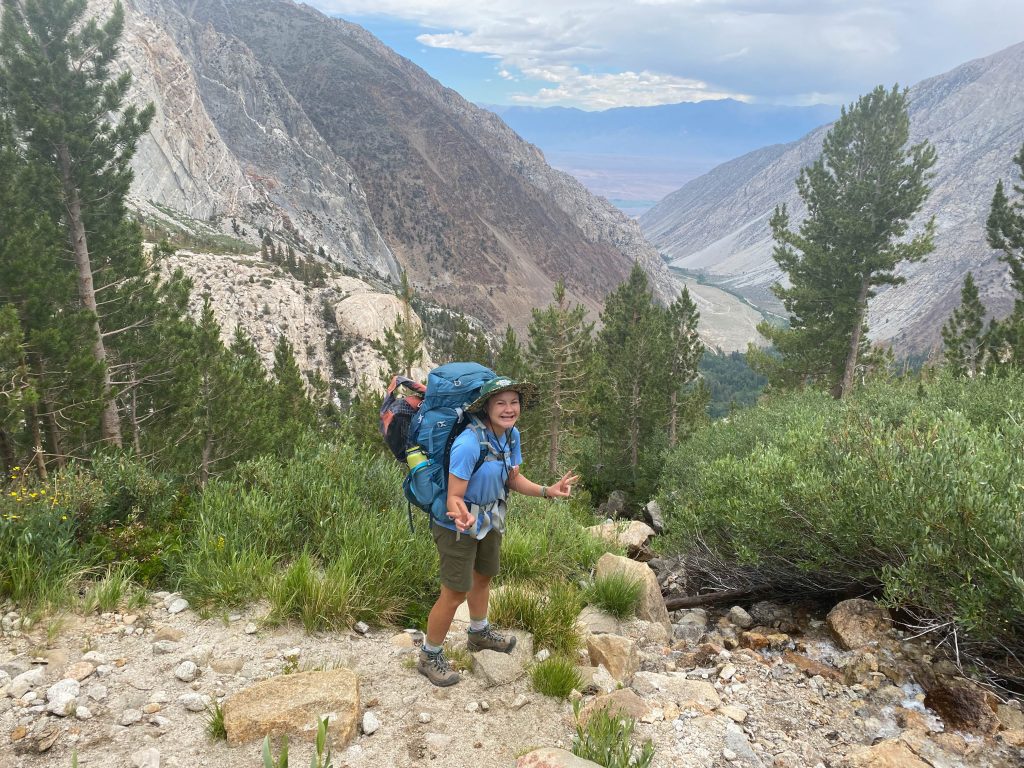
Teens thrive on risk. Thanks to recent findings (described in Age of Opportunity and Brainstorm) about the unique attributes of the teen brain, we now understand the reason for the “mortality bump” for 17-year-old boys. They do stupid, daring things not because they aren’t aware of the dangers, but because—to them—the reward of leaping from a rocky cliff or speeding along a curvy mountain road seems to outweigh the risk.
A teen at camp has the opportunity to take many safe, controlled risks. Climbing to new heights on a rock wall or ropes course, jumping the wake of a boat on a wake board, or reaching the peak of a 10,000-foot summit are all healthy risks teens take at camp. Plus, being in a controlled camp environment frees teens from exposure to health risks like alcohol and drug use.
#3 Experience Character Growth and Develop Life Skills
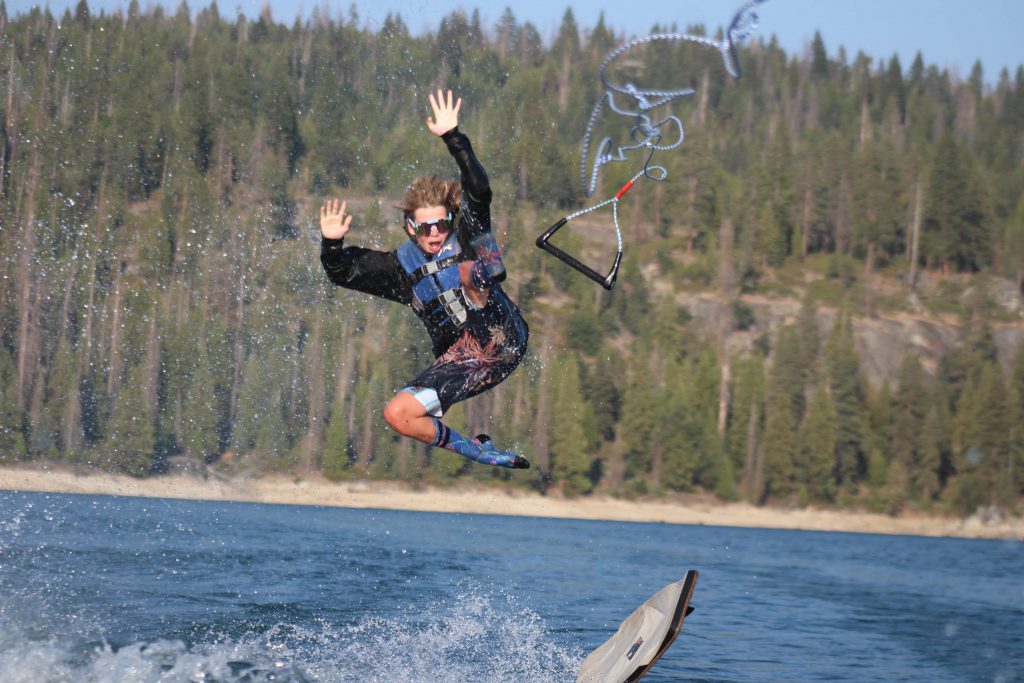
“A profound gap exists between the knowledge and skills most students learn in school and the knowledge and skills they need for success in their communities and workplaces.” –Partnership for 21st Century Skills
Schools aren’t doing a very good job teaching kids grit, perseverance, and leadership. But that’s not their job. Rather, schools are VERY busy teaching the core curriculum and assessing how well our kids know it. No school has time to see how “gritty” a kid is, but at camp, the “grit-meter” is always running, and it’s personal character—not a report card or an athletic achievement—that rises to the top.
Teens also develop other important life skills at camp, including independence, responsibility, and decision-making. Teens grow considerably in an environment away from their parents where they are forced to live on their own and find their own resources.
#4 Meet Positive Role Models
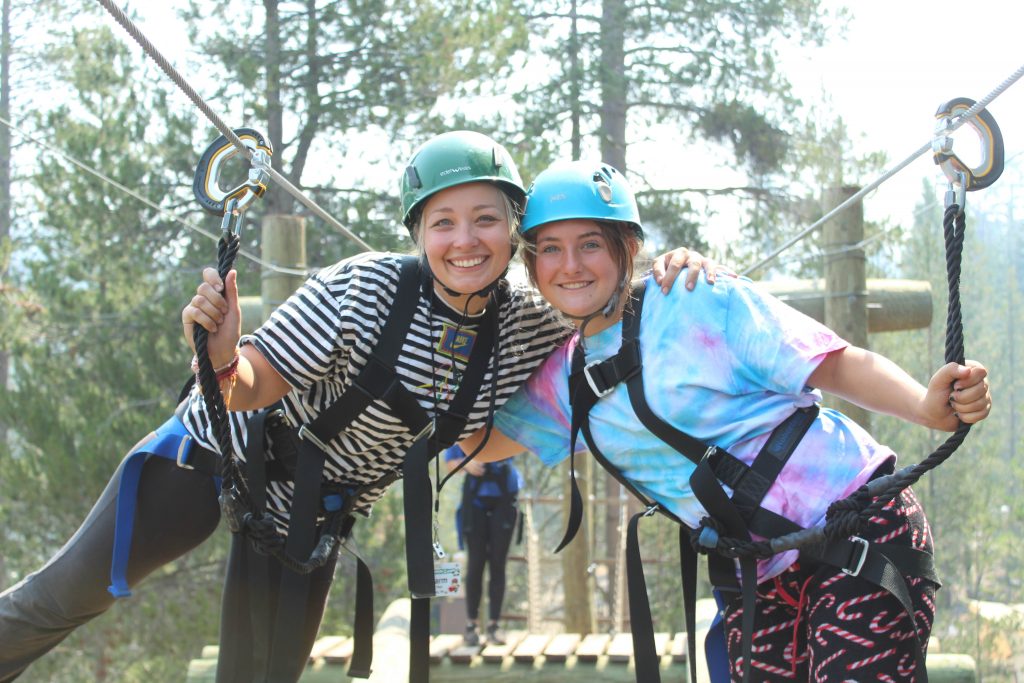
Watch or listen to a popular music video, reality TV show, or sports event, and you’ll be hard-pressed to find positive young adults teens can emulate. But walk into any well-run summer camp and you’ll be surrounded by wholesome, outdoorsy young people who like being around others and doing fun activities. Camp offers teens the opportunity to be among young adults who are positive role models and to form close relationships with them. Most camp counselors are hard-working college students who want to serve others. They are friendly, personable, and are just the kind of young adults you want your teen to become.
#5 Discover Their Best Self
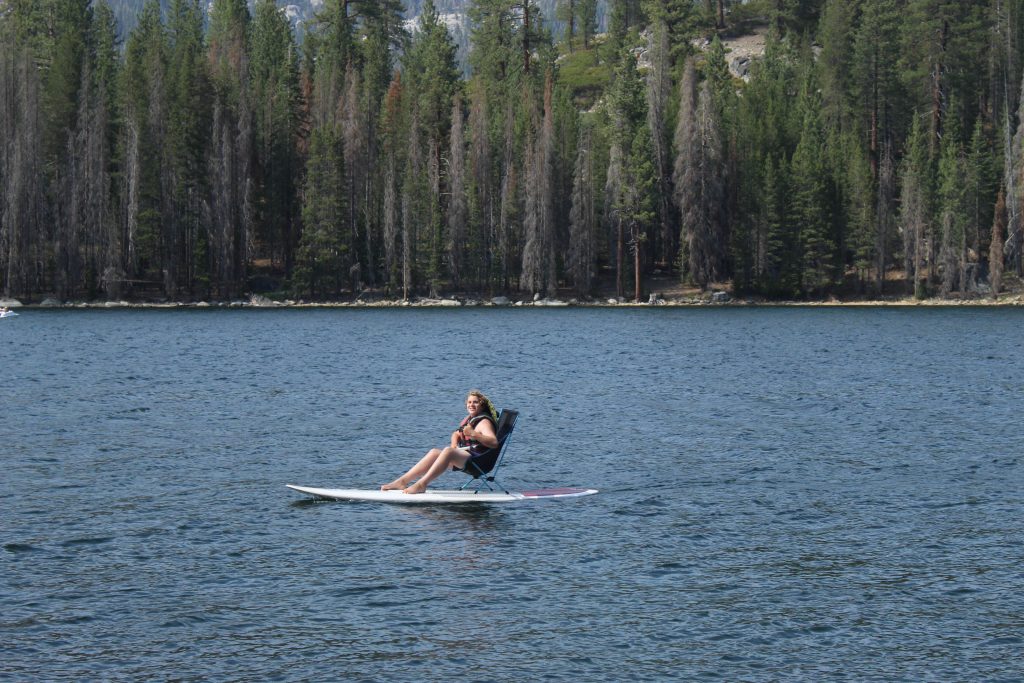
We live in a world where teens—often by their own parents—are steered towards success via the SAT, the college admissions grind, a “good” major, and a high-salary job. Look around at many adults, however, and see where that path got them. Despite knowing better, we still expose our kids to the same gauntlet.
Perhaps college education is the best option for most young people, but I’ve met many who are halfway done (or all the way done) and still don’t know who they are or what they are passionate about. Camp experiences offer teens the chance to step back from the treadmill of academics, competitive sports, and their sleep-deprived, over-scheduled existence, and instead think about what’s important to them. Many campers become less self-absorbed after spending a few weeks at camp, learning to train their focus on others. They also discover new hobbies and avenues to pursue in education and their future careers.
Each summer, tens of thousands of teens leave their phones and car keys at home and head to summer camp as campers, counselors in training, or counselors. Many teens who have never been to camp cannot relate to how a teenager could make such crazy personal sacrifices. And yet, teens are the age group that fills most quickly at many camps. Because, perhaps more than any other time during youth, camp offers the respite, recreation, and renewal to help teens thrive. Teens who have already been to camp know this and want to come back, year after year.

Gold Arrow Camp offers a Junior Counselor Program for returning GAC campers and an Outdoor Leadership Course for teens (grades 9th-11th).
Originally published at Sunshine Parenting.
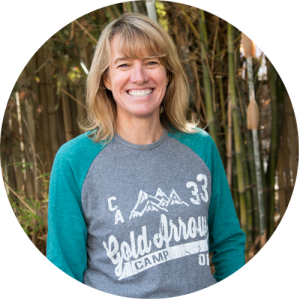
Audrey “Sunshine” Monke, MA, has been the owner of Gold Arrow Camp since 1989 and currently serves as the Chief Visionary Officer. In addition to her vision-casting and mentoring at GAC, Sunshine is an author (Happy Campers: 9 Summer Camp Secrets for Raising Kids Who Become Thriving Adults), podcast host, speaker and coach on the topics of parenting, social skills, and happiness. Find out more at her website, Sunshine Parenting.
Visit Sunshine Parenting for more summer camp-related posts & podcast episodes.
The Gift of Handwritten Letters
Recently, I’ve been going through the many boxes of letters, photos, and memorabilia which I have collected over my first five decades. It’s been a time-consuming task, but I’m trying to organize into a smaller number of boxes what has been accumulated over the first half of my life. What has struck me most is the huge number of letters I amassed from my childhood, high school, and college friends. Until this week, I didn’t remember how much we corresponded, but I just finished going through hundreds of letters. I now have proof of the many friendships that were solidified over hours of writing to one another.
I mostly have the ones written to me, but I can assume from the “Thanks for your letter”s that I was writing at the same rate as my friends were. Maybe some of my letters are in a box out there somewhere?
 Not only was there a huge volume of letters (see picture), some of the letters were ten pages long, with tiny writing. Others were short notes or fun greeting cards. Most of them were in beautiful, cursive writing, even some from boys! What an amazing thing to think about. Back then, without the distractions we all have today, we had TIME to write letters like that! Plus, we enjoyed it and we were good at it! We wrote letters because often long-distance phone calls were too expensive. Many of us traveled and studied overseas, so the letters chronicle our trips.
Not only was there a huge volume of letters (see picture), some of the letters were ten pages long, with tiny writing. Others were short notes or fun greeting cards. Most of them were in beautiful, cursive writing, even some from boys! What an amazing thing to think about. Back then, without the distractions we all have today, we had TIME to write letters like that! Plus, we enjoyed it and we were good at it! We wrote letters because often long-distance phone calls were too expensive. Many of us traveled and studied overseas, so the letters chronicle our trips.
The process of trying to get rid of most of this paper required that I at least skim through each one. I pulled out many that I simply can’t bear to throw away. I found letters from my late grandparents, with their words of wisdom. I found letters my parents had written to me over the years. I also found letters from friends showing major teen angst, which is a good reminder now that I have teens of my own. We weren’t that different back then after all! It’s just that we didn’t splash our anger and sadness at each other on Facebook. We wrote each other heartfelt notes.
One thing I realized is that my kids will not have a big box of letters like mine. They don’t write letters like we did in the pre-computer, pre-email, pre-social networking, pre-cell phone era. But then I had a revelation! They DO still get to send and receive letters. It’s when they’re at camp! I have told parents how much campers enjoy getting “real” mail while at camp (the kind with a stamp), but now I have realized another benefit – they will have these letters as keepsakes and memories of their childhood. And you, as parents, most definitely should save all of the letters you get from your camper!
Among my box, I came across a postcard I sent to my parents in 1977, when I was a camper at Gold Arrow Camp. This is what it said:
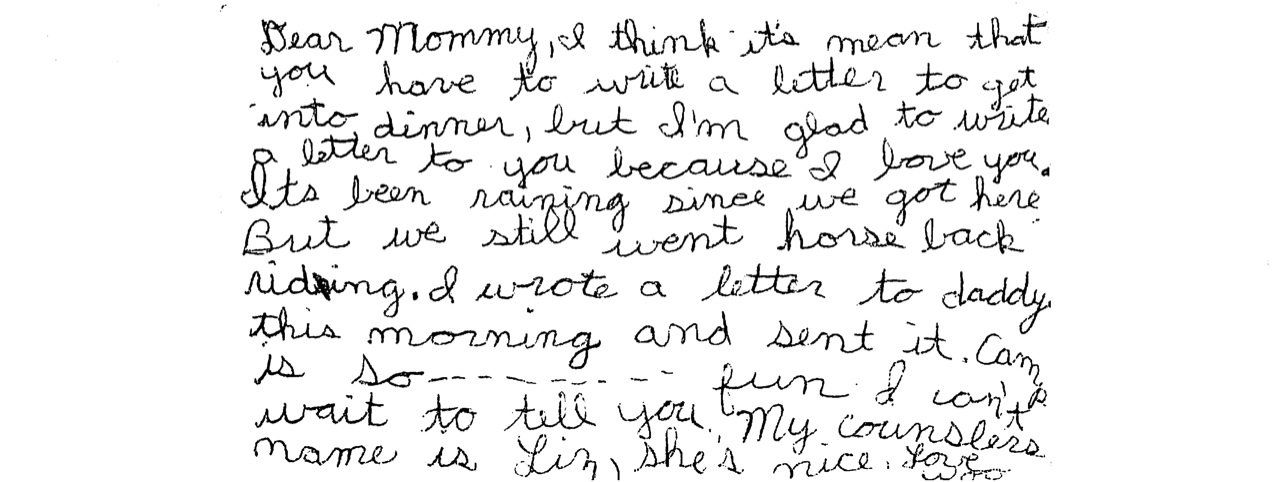
My postcard home from camp, 1977.
“Dear Mommy,
I think it’s mean that you have to write a letter to get into dinner, but I’m glad to write a letter to you because I love you. It’s been raining since we got here. But we still went horseback riding. I wrote a letter to daddy this morning and sent it. Camp is so fun. I can’t wait to tell you. My counslers name is Liz. She’s nice.
Love, Audrey”
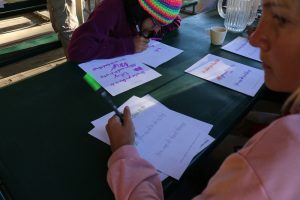 Let me tell you, we have gotten some good laughs in our house over this postcard. Not just about how I spelled “counselor,” but about my comment about the “Mail Meal” (dinners on Wednesday and Sunday that you need to have a letter or postcard home as your ticket in). The dreaded “Mail Meal” has been a camp tradition for as long as anyone can remember, but I didn’t even remember thinking it was a bad thing. My adult view is much different than my ten-year-old one! I now understand how much parents need those letters. I hope most kids get beyond the “I have to write this letter” part, and share some of their feelings and memories of camp. The resulting memorabilia will be priceless.
Let me tell you, we have gotten some good laughs in our house over this postcard. Not just about how I spelled “counselor,” but about my comment about the “Mail Meal” (dinners on Wednesday and Sunday that you need to have a letter or postcard home as your ticket in). The dreaded “Mail Meal” has been a camp tradition for as long as anyone can remember, but I didn’t even remember thinking it was a bad thing. My adult view is much different than my ten-year-old one! I now understand how much parents need those letters. I hope most kids get beyond the “I have to write this letter” part, and share some of their feelings and memories of camp. The resulting memorabilia will be priceless.
So, here’s to another benefit of camp I’ve only this week realized. We have the chance for our kids to experience the (almost) lost art of writing and receiving handwritten letters. And you, as a parent, have a chance to write down words that your child will be able to read and keep long beyond any email you’ve sent them!
P.S. Did you see this hilarious book? P.S. I Hate it Here: Letters from Camp It is full of some really funny, real letters kids wrote to their parents from camps.
4 Reasons For 2 Weeks
“Do you have a one week session?” is one of the questions we often get asked by parents who are new to our program. The question is usually preceded or followed by the comment, “Two weeks is too long for my child.”
I thought it would be helpful to outline for new parents why Gold Arrow Camp has a two-week session length as our primary camp offering. Although we also offer one-week Mini Camp programs at the end of the summer, Gold Arrow Camp’s core program is a two-week session, and that is the length of time the majority of our campers attend camp. We also have campers who are “Monthers,” who attend four weeks of camp by combining two, two-week sessions.
There are many benefits to camp, regardless of length of stay, as per this American Camp Association study. So, I urge you to find a camp that fits your family’s needs and schedule, even if Gold Arrow is not the best fit for you.
Our program, up until the 1970s, was a month-long program. Many traditional, East Coast camps still offer only one 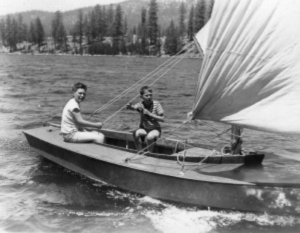 seven or eight-week session. To people in the West, this sounds crazy, as most programs on our side of the country are one-week in length. However, families who have been part of Gold Arrow and other traditional camp programs understand the benefits of a longer camp stay.
seven or eight-week session. To people in the West, this sounds crazy, as most programs on our side of the country are one-week in length. However, families who have been part of Gold Arrow and other traditional camp programs understand the benefits of a longer camp stay.
Many traditional camps in California have started offering one-week programs because that’s what many parents think they want for their child. Fortunately, our camp families have kept our two-week sessions consistently full, so we will continue to offer what we consider the best length for our program.
Why does Gold Arrow Camp have two-week sessions?
Here are four reasons:
Community and Friendship Building
Breadth and Depth of Activities
Social Skill Development
Independence and Confidence Building
1. Community and Friendship Building
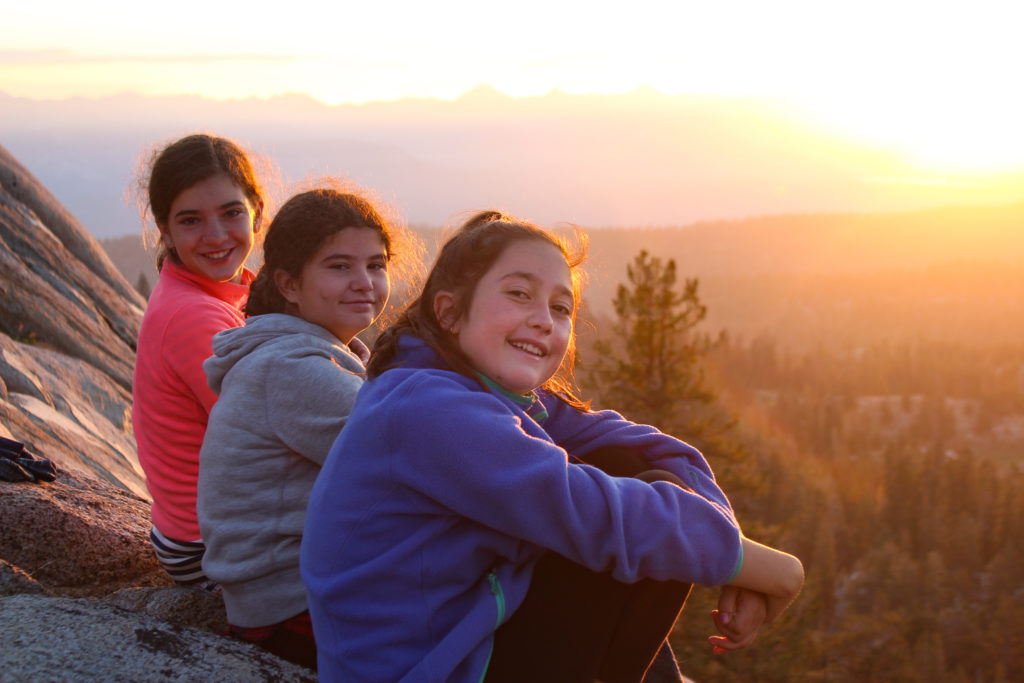
“My son has no fears about making friends at his new school because of the experiences he has at GAC. His self-confidence and outgoing nature are so nurtured at GAC that he feels prepared for anything!” – GAC Parent
While a lot of fun happens during even just one day of camp, spending more time connecting and building bonds with counselors, cabin mates, and other campers is one of the benefits of a two-week stay.
The first week of the session, there is an adjustment period for the first few days, when campers are getting settled and getting to know one another, the schedule, and the activities. By the middle of the first week, campers feel settled and comfortable at camp, and relationships have the opportunity to start getting deeper. Friendships, while they can definitely be formed in one week, have a better chance to grow stronger and deeper with more connection time.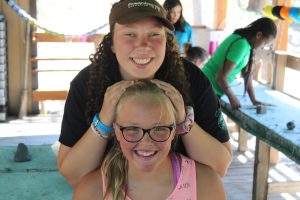
“My children lead busy lives during the school year with various teams and enrichment programs. Going to Gold Arrow Camp allows them to unwind and gain a new perspective on friendship, goals and life. From my perspective, GAC is summer the way it is supposed to be for kids. Thank you!!” – GAC Parent
Because all of the campers in the cabin group are at camp for the same length of time (two weeks), there are no departures and arrivals in the middle of the session to disrupt the group’s cohesiveness and the bonds that have developed. Everyone arrives together and departs together, with the exception of our Monther campers, who stay on for another session after their first two-weeks end.
2. Breadth and Depth of Activities
“My son came to Gold Arrow for the first time not knowing any of his cabin-mates. By the end of his two week session, he had made great friends and wanted me to ensure he could be in the same cabin with them next summer. He had a wonderful time at all the activities, but the stories he tells most are the ones involving fun with his new friends.” – GAC Parent
We take advantage of our location on Huntington Lake, in the heart of the Sierra National Forest, by teaching campers a large variety of water and land-based recreational activities. Many of our activities require extensive time and instruction. Sailing, as an example, is an activity that begins with a 2 ½ hour group lesson, and can be followed up by many additional lessons as campers opt for more sailing during Free Time. Without adequate time, it would be impossible for campers to even get to all of the activities we offer, let alone build skills in them. We want our campers to get exposure to all of what is offered at camp, and have the opportunity to pursue activities they are passionate about.
During their two weeks at Gold Arrow, campers have the opportunity to learn to sail, ride a horse, shoot a rifle, get up 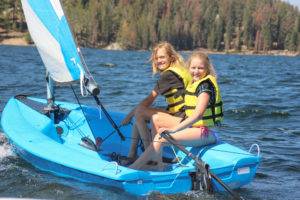 on water skis, and participate in a myriad of other activities. Many of these sports require time and practice to master. For first-time campers, two weeks is just enough time to expose them to all of the different activities and start practicing and improving skills. Returning campers continue to build upon and develop new skills, even after five or six years at our program. The depth of instruction offered, the opportunity to improve recreational skills, and the ability to earn different patches all distinguish Gold Arrow Camp’s program.
on water skis, and participate in a myriad of other activities. Many of these sports require time and practice to master. For first-time campers, two weeks is just enough time to expose them to all of the different activities and start practicing and improving skills. Returning campers continue to build upon and develop new skills, even after five or six years at our program. The depth of instruction offered, the opportunity to improve recreational skills, and the ability to earn different patches all distinguish Gold Arrow Camp’s program.
We have two outpost programs, away from our main camp, that take up a portion of the two-week session. We have a water sports outpost camp on an island on Shaver Lake where campers enjoy one or two nights camping on the beach. At Shaver Island, campers spend their days on the lake improving their skills in waterskiing, wakeboarding, and kneeboarding. While these sports are also done at our main camp on Huntington Lake, their stay at Shaver allows our two-week campers time to really improve their skills with a lot of “behind the boat” time. Our other outpost program is backpacking. All campers go on a one-night overnight backpacking trip and get to experience outdoor cooking, sleeping under the stars, and living in nature. There are some activities that we wait to do until the second week of camp, when campers are feeling connected and more comfortable taking risks.
Honestly, even two weeks seems short to us. We barely get campers to all of our activities, and it’s time for them to go home!
3. Social Skills Development
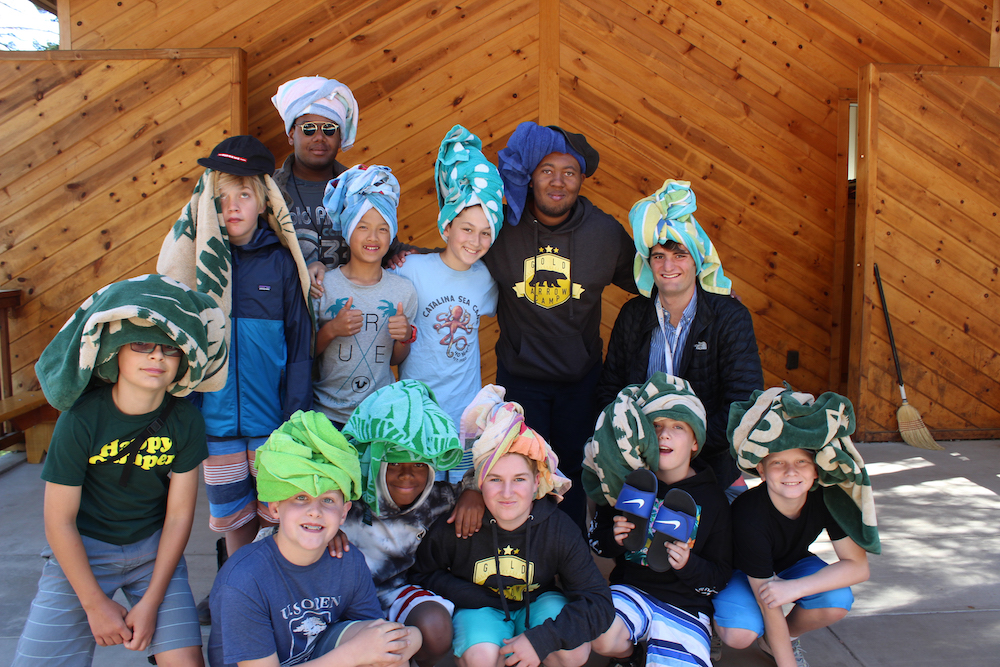
“Wonderful camp where my kids grew up and will have fond childhood memories. They both went from being scared and unsure their first summer, to loving camp at age 14 and wishing they could come back! I love the electronics-free policy – it is much needed, especially in this day and age, where kids and teens can enjoy the outdoors, making friends and having fun in the beautiful mountains!” – GAC Parent
Kids benefit from experiences living and working in groups regardless of the length of time. However, I believe that allowing a group to really bond and connect also allows kids to grow their communication, teamwork, and conflict resolution skills more than when they are in a shorter-term program.
4. Independence and Confidence Building
“My son had no idea what he was going to as he had never been to an out of town camp before let alone away from me for 2 whole weeks. When he returned, yes he was tired but he had the time of his life! He wrote me half way through his stay at GAC and told me “this place is magical and awesome!” I am hoping to be able to send him next year as well. What a great experience for my 8 yr old son!!!” -GAC Parent
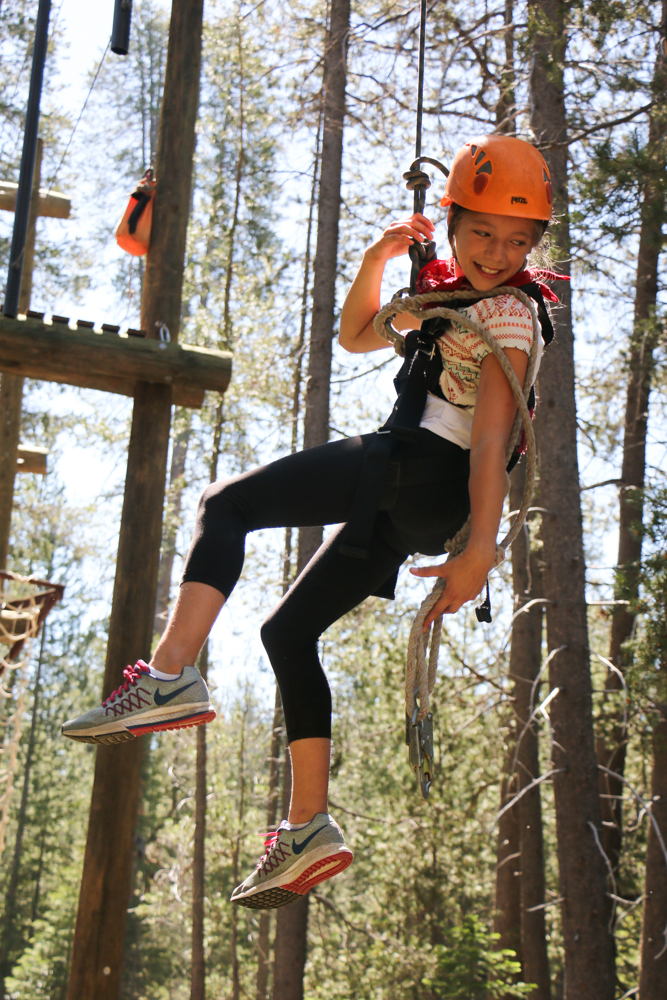 For many kids, their stay at camp is the first time that they have ever been away from their parents at all. Some have attended sleep-overs, weekend scout camps, or week-long school programs, but for many campers, their first stay at Gold Arrow is the longest they’ve been away from their parents. We know this, and our counselors are trained to help first-time campers get adjusted to being away and learn to cope with feelings of missing their parents.
For many kids, their stay at camp is the first time that they have ever been away from their parents at all. Some have attended sleep-overs, weekend scout camps, or week-long school programs, but for many campers, their first stay at Gold Arrow is the longest they’ve been away from their parents. We know this, and our counselors are trained to help first-time campers get adjusted to being away and learn to cope with feelings of missing their parents.
Campers feel a great sense of pride in themselves after “being on their own,” and having fun, without mom or dad nearby. While two weeks seem slow to parents, especially during their first camp experience, the days fly by at Camp.
“Our daughter always comes back from Gold Arrow the truest version of herself.” – GAC Parent
Want An Independent, Self-Confident Kid? Camp Can Help!
By Audrey “Sunshine” Monke, Camp Director. Originally published at Sunshine Parenting.
While it’s easy to think of ways to teach our kids to do laundry or solve math problems, finding a way to instill important character traits isn’t as simple. The way we model traits we want our children to exhibit has a powerful influence on them, and some traits (kindness, gratitude, and generosity) they learn first and foremost from parents.
But there are other traits best learned through experiences outside the home and beyond the watchful (sometimes too watchful) eyes of parents. Camp experiences offer exactly the kind of experience away from home where children grow important character traits like independence, self-confidence, and grit.
#1 Independence
“Looking back at my life, camp has been the most influential part of it. I can truly say camp is where I developed my independence, gained confidence, and learned what friendship truly means.”
-Lizz
Being hyper-involved and in constant communication with our children has become something modern parents brag about. But when do we start letting go and giving our kids a chance to feel independent? This has become much more challenging in an age where cell phones are always attached to our (and their) hips and tracking apps are ubiquitous. In fact, as parents today we tend to foster dependence even when we’re trying not to. Forgot their lunch? A friend says something mean? Stubbed their toe? We know right away and swoop in to help.
Whether the result of parenting trends or ultra-high levels of physical and digital connectedness, today’s children are much less independent than we were at the same age. I find it hard to resist editing my son’s paper to make it “just a little bit better” or jumping in to help make his lunch when he’s running late for school. Thirty years ago, we were babysitting infants at age 13. Today, some of us hire babysitters for our 13-year-olds!
Camp experiences offer unique opportunities for kids to see how much they can do without us hovering nearby. They build their independence skills because they take more responsibility for themselves and their belongings, make their own decisions, and feel a sense of autonomy. For many kids, camp is the first opportunity they’ve had to experience these things.
#2 Self-Confidence
“Camp has really helped me become more confident with who I am and has helped me try new things. Without camp, I would be too shy to go up to someone and introduce myself. Camp has had a giant impact on my personality, and without it I would be a completely different person.”
-Stephanie
When we tell our kid she’s “great” at something, it’s easy for her to be wary of the praise. We parents are notorious for seeing our kids through rose-colored lenses and thinking they are the greatest at _______ (fill in the blank); our kids know intuitively that our assessment of them, however complimentary, is most likely not accurate or objective.
However, when another respected adult mentor – like a camp counselor! – recognizes a positive trait in our child and points it out, that can have a powerful impact. When someone outside the immediate family recognizes our child’s unique qualities and helps him or her address weaknesses, it can build real self-confidence.
#3 Grit
“I love the encouragement that I got, both from counselors and campers, to try new things all the time. I love that the camp encourages you to do that. The camp atmosphere made me stand out and be unique, in ways that I would have been too embarrassed to try at home.”
-Claire
“Grit” became the new buzzword in education and parenting circles thanks to Paul Tough’s best-selling book, How Children Succeed. Angela Duckworth further cemented the importance of grit, or resilience, in her popular TED talk: Grit, the Power of Passion and Perseverance, and her book, Grit. People with grit have “stick-to-itiveness,” persistence, and resilience, all of which help them work hard and push past difficulties and failures.
We all need some grit. But how do we teach grit to a distinctively non-gritty kid or young adult—one who quits when something gets challenging, who doesn’t want to try anything new or difficult, or who prefers playing endless video games to practicing piano, reading, or some other more useful-seeming skill?
As parents, it’s hard to create experiences that require our children to use grit, but at camp those experiences happen every day. While struggling to climb the rock wall or attempting to get up on water skis for the 12th time, our kids develop their grit muscles in a big way at camp. And, they likely wouldn’t try for as long or as hard if we parents were hovering nearby with our worried expressions. At camp, kids are encouraged to set goals, challenge themselves, and overcome failure again and again. And that develops their grit.
Interrupting the cycle of dependence can only happen when we as parents are willing to encourage our children to develop their independence, self-confidence, and grit, and, though it may seem counter-intuitive, that happens best when we’re not around.
Related/Resources:
Angela Duckworth’s TED Talk: Grit, the Power of Passion and Perseverance
How Children Succeed: Grit, Curiosity, and the Hidden Power of Character, Paul Tough
10 Reasons Great Parents Choose Summer Camp
Too Much Screen Time? 4 Ways Summer Camp Can Help
3 Ways To Make Family Dinner Like A Campfire
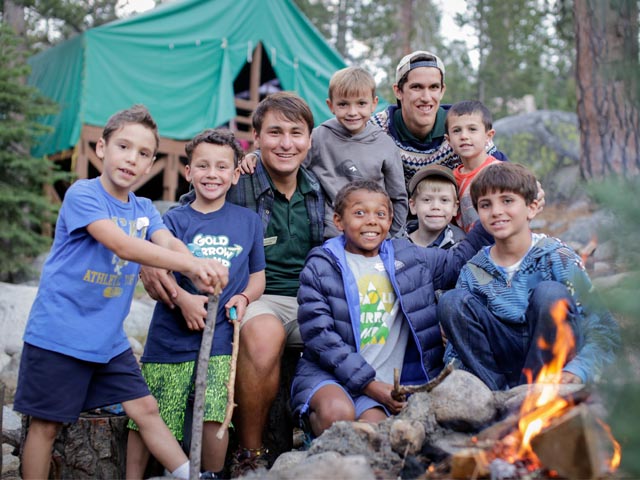
Most of us know the importance of family dinners:
Kids who regularly eat dinner with their families are more emotionally stable, are less likely to abuse drugs and alcohol, get better grades, have fewer depressive symptoms, and are less inclined to obesity or eating disorders.
It’s certainly a compelling list. But what can you do if your family dinner isn’t that great? If people just “eat and run” or don’t really connect? One answer might be turning your dinner table into a campfire pit. Not literally, of course, but group campfires at summer camp offer a great example of fun, engaging activities that have helped make dinners at our house last longer than the ten minutes it takes my boys to shovel down their food.
Here are some ideas:
Sharing highs, lows, and “gratitudes” (I know that’s not a real word, but that’s what we use)
One way we’ve found to get everyone talking and contributing at our dinner table is consistent sharing time. We find out what’s going on in our kids’ lives (and in the lives of unsuspecting visiting friends) and we as parents share what’s going on in ours. For children who are quieter and generally don’t “take the floor” as often, this consistent discussion helps them open up. And for those who don’t naturally focus on the good things, it helps them see the positive in their day.
Around the campfire, it’s an activity called “High & Lows,” or—as it’s now evolved in our family—“Highs, Lows, and Gratitudes.” It’s very simple: Each person has a turn (uninterrupted, with everyone focused on that one person) to share
• their HIGH point of the day,
• their LOW point of the day, and
• their GRATITUDE—what they’re feeling grateful for.
For a twist, we sometimes make rules for sharing: a “high” might be limited to three words, or a “low” might have a one word limit. It creates a fun challenge and makes us think. If we can’t come up with a low, we share another high.
Sometimes, we interrupt, tell long stories, or go off on tangents, but that’s okay. We’re connecting, sharing, and discovering what’s happening in each other’s lives. Our dinners last much longer than ten minutes, and our kids know they won’t be excused until everyone shares.
In The Whole-Brain Child, Daniel Siegel and Tina Payne Bryson write about the importance of getting kids to remember their stories. So, instead of asking “How was your day?” which invariably gets a one-word response, they recommend asking “What was the best part of your day?” and “What was your not-the-best part?” Sounds like a high and low of the day to me!
Question or topic of the night
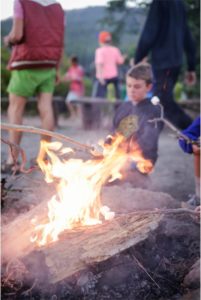 There are so many fun books and table games available, but you can probably just take turns thinking up a fun question for each person to answer, much like counselors do around a campfire. For my birthday a few weeks ago, a friend who knows me well gave me Q & A a day for Kids by Betsy Franco, which has 365 questions (one for each day) to discuss with your kids. We also have used The Enchanted Table (by Memorable Mealtimes) and Table Topics, a box of questions that our kids like taking turns reading.
There are so many fun books and table games available, but you can probably just take turns thinking up a fun question for each person to answer, much like counselors do around a campfire. For my birthday a few weeks ago, a friend who knows me well gave me Q & A a day for Kids by Betsy Franco, which has 365 questions (one for each day) to discuss with your kids. We also have used The Enchanted Table (by Memorable Mealtimes) and Table Topics, a box of questions that our kids like taking turns reading.
Family Meeting (once per week)
At camp, we always start the session with what we call our “First Night Campfire.” The counselor has a specific agenda for the campfire, which includes all the kids getting to know each other, sharing a goal they have for camp, and what guidelines they want to live by during their two-week stay. Families need to do the same kind of checking in with one other, so—once a week—we have a “Family Meeting” during dinner. We have an agenda that’s on a legal pad next to the table, and we take turns being the “chair” of the meeting.
On our agenda:
• What’s going on this week? We talk about the schedule for the coming week (any big projects/assignments due, any events, parents going anywhere)
• Goal for the week: Each person shares a goal for the week (something we want to get done, do better, etc.)
• A value or social skill we want to talk about. These have been focused on social skills for the past year in our house, and we’ve talked about things like looking someone in the eye while meeting them and how to chat with an adult. We’ve also used this printable (“10 Social Manners for Kids” from iMom) for several topics. Lately, it’s been a contest to see who can remember all ten!
We’ll hold fast to our family dinner time as long as we have kids in the house; I know it will be over far too soon. In the whirl of the last four years, our family group of seven has dwindled to the “final four”: me, my husband, and our two youngest. The meals we share are nothing like June Cleaver’s pot roast, and they often involve my awesome husband cooking or picking up something easy to eat or make. It’s rarely a big production, but it’s still really big. When we are gathered around our table eating and talking—with no phones or tablets in sight—it doesn’t matter if we have a home-cooked meal or a Panda bowl; as long as we’re connecting and sharing, it’s the biggest and best part—it’s our HIGH point—of the day.
All we’re missing is the campfire.
Originally published at Sunshine Parenting.

Audrey “Sunshine” Monke, MA, has been the owner of Gold Arrow Camp since 1989 and currently serves as the Chief Visionary Officer. In addition to her vision-casting and mentoring at GAC, Sunshine is an author (Happy Campers: 9 Summer Camp Secrets for Raising Kids Who Become Thriving Adults), podcast host, speaker and coach on the topics of parenting, social skills, and happiness. Find out more at her website, Sunshine Parenting.
Visit Sunshine Parenting for more summer camp-related posts & podcast episodes.
How Camp Teaches 21st Century Skills
“A profound gap exists between the knowledge and skills most students learn in school and the knowledge and skills they need for success in their communities and workplaces.”
-Partnership for 21st Century Skills
“Having started at Gold Arrow as a little seven year old, I have grown up here. Camp has become my home away from home, and I can honestly say it has shaped who I am today. It has given me confidence and taught me skills far beyond learning how to wakeboard or horseback ride. I am comfortable with myself, I am patient, and I have learned how to become a leader.”
-Katie “Rascal” Baral, 10 year Camper
Parents, educators, and youth development professionals are well-versed in the phrase “21st Century Skills.” The phrase encompasses our current understanding of the urgent need for our children to be learning more than how to read, write, and do math. There are many other skills needed to grow into productive, successful adults. As I look at the list of 21st Century Skills, I am struck by how many of the skills are intentionally modeled and taught at camp. Following are five specific 21st Century skills that children learn at camp:
Working Creatively with Others
Campers learn to work creatively with others through working towards goals with their cabin group. Even something as simple as collaborating on a skit, song, or dance requires being open and responsive to different perspectives and incorporating group input. An important aspect of creativity and innovation is being able to “view failure as an opportunity to learn.” At camp, with every new and challenging activity, campers are encouraged to challenge themselves and persevere past failure. They learn that “creativity and innovation is a long-term, cyclical process of small successes and frequent mistakes.”
Communication
From the moment they arrive at camp, campers have the opportunity to practice and hone their communication skills. Gathered around the campfire on the first evening, campers talk about themselves in front of their small cabin group. They also listen to others share about themselves. At meals, campfires, and while walking around camp and participating in activities, counselors guide discussions about deeper issues and make sure all campers participate, even those who are less outgoing. Listening skills are addressed and enhanced through practice. Without the distractions and escape of technology, campers practice articulating thoughts and ideas and listening to the ideas of others throughout their time at camp.
Collaboration
When working together at Team Building, during cabin clean up, or while preparing for a performance, campers learn important collaboration skills. They learn that they need to be flexible. They often learn another important collaboration skills, which is that it is often necessary to make compromises to accomplish a goal. Counselors encourage campers to share responsibility for tasks and work together. Campers are also encouraged to value and acknowledge each individual contribution made by team members.
Social and Cross-Cultural Skills
Learning to interact effectively with others is an important social skill that doesn’t come naturally to all people. At camp, counselors guide campers to learn when it is appropriate to listen and when it is appropriate to speak. Counselors also require that campers respectfully listen to others’ opinions and treat others with respect.
For many campers, their time at camp is their first opportunity to meet and live with people from other cultures. Camp offers the opportunity for kids to form friendships with staff and campers from other countries. Camp provides the opportunity for campers to gain a respect for and work effectively with people from a range of cultural backgrounds. On International Day each session, we celebrate and learn about our international campers and staff.
Leadership and Responsibility
Guiding and leading others is an important 21st Century skill. In campers’ early years at camp, they learn basic responsibility for themselves and those around them. Even our youngest campers have the opportunity to lead others in a song or game. As they get older, campers gain more of an understanding of how their words and actions influence others, and they learn how to positively use their leadership skills.
While academics are important, children need other skills to be successful. Camp offers an ideal setting for campers to learn and enhance many of the non-academic 21st Century Skills. One line of our camp song says, “I sure did learn much more here than I ever did at school.” And, when learning is viewed as more global than the subjects listed on the report card, that is an incredibly profound and true statement.
Read about all of the 21st Century Skills at www.p21.org.

Audrey “Sunshine” Monke, MA, has been the owner of Gold Arrow Camp since 1989 and currently serves as the Chief Visionary Officer. In addition to her vision-casting and mentoring at GAC, Sunshine is an author (Happy Campers: 9 Summer Camp Secrets for Raising Kids Who Become Thriving Adults), podcast host, speaker and coach on the topics of parenting, social skills, and happiness. Find out more at her website, Sunshine Parenting.

